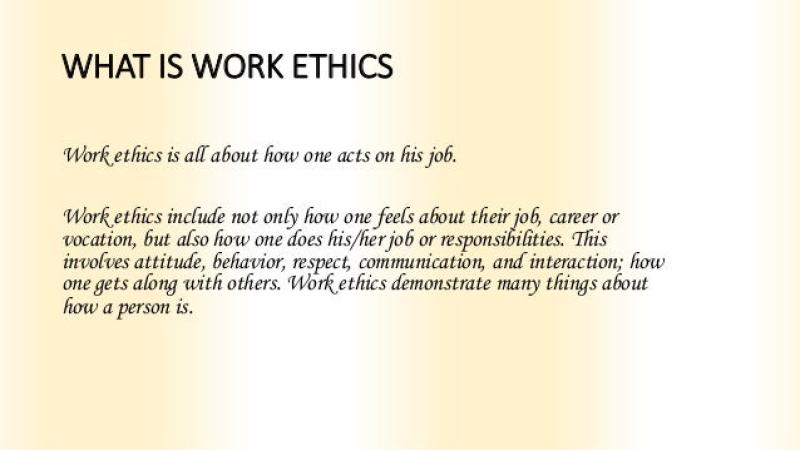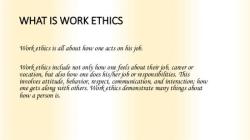What is work ethic?
Work ethic refers to a set of moral principles, values, and behaviors that guide an individual's approach to work, professional conduct, and overall commitment to fulfilling job responsibilities. It encompasses attitudes and habits that reflect a person's dedication, integrity, and sense of responsibility in the workplace. A strong work ethic is characterized by qualities such as diligence, reliability, professionalism, and a commitment to producing high-quality results.
Key components of a strong work ethic include:
Diligence:
- Diligence involves a persistent and earnest effort to complete tasks thoroughly and efficiently. It implies a strong work ethic and a commitment to giving one's best effort in all work-related activities.
Reliability:
- Reliability is the trait of being trustworthy and dependable. Individuals with a strong work ethic can be relied upon to fulfill their commitments, meet deadlines, and consistently produce quality work.
Responsibility:
- Responsibility in the workplace involves taking ownership of one's actions and being accountable for job duties. It includes recognizing and addressing mistakes and working to correct them.
Professionalism:
- Professionalism encompasses behaviors and attitudes that align with the expectations of a particular profession or workplace. This includes dressing appropriately, maintaining a positive attitude, and conducting oneself with integrity and courtesy.
Time Management:
- Effective time management is a crucial aspect of work ethic. It involves prioritizing tasks, meeting deadlines, and utilizing time efficiently to maximize productivity.
Initiative:
- Taking initiative involves being proactive and self-motivated. Individuals with a strong work ethic go beyond basic job requirements, actively seek opportunities for improvement, and contribute to the success of their team or organization.
Adaptability:
- Adaptability is the ability to adjust to changing circumstances and embrace new challenges. A strong work ethic includes a willingness to learn new skills and adapt to evolving work environments.
Teamwork:
- Collaboration and effective communication with colleagues are integral to a strong work ethic. Individuals who value teamwork contribute positively to the overall success of the team and the organization.
Positive Attitude:
- Maintaining a positive attitude, even in challenging situations, is indicative of a strong work ethic. Positivity can contribute to a healthy work environment and foster resilience in the face of difficulties.
Continuous Learning:
- A commitment to continuous learning and professional development is a key aspect of work ethic. Individuals who seek to enhance their skills and knowledge demonstrate a proactive approach to personal and career growth.
Work ethic is not only about the quantity of work produced but also about the quality of work and the manner in which it is approached. It plays a crucial role in personal and professional success, contributing to individual job satisfaction, career advancement, and the overall success of organizations.
What defines the concept of work ethic?
The concept of "work ethic" encompasses a complex interplay of values, attitudes, and behaviors that influence one's approach to work. It goes beyond simply putting in the hours and speaks to a deeper commitment and dedication to one's professional responsibilities. Here are some key elements that define the concept of work ethic:
Values:
- Importance of work: A strong work ethic prioritizes work as a meaningful and valuable activity contributing to personal growth and societal well-being.
- Integrity and honesty: Upholding ethical standards and fairness in all work-related interactions is crucial.
- Accountability and responsibility: Taking ownership of one's actions and tasks, striving for excellence, and readily accepting responsibility for mistakes are essential aspects.
- Continuous learning and improvement: Demonstrating a commitment to learning new skills, staying updated with industry trends, and actively seeking personal and professional development opportunities.
- Teamwork and collaboration: Recognizing the importance of working effectively with colleagues and contributing to a positive and supportive work environment.
Attitudes:
- Proactive and solution-oriented: Taking initiative, identifying and addressing problems before they escalate, and actively seeking solutions are key attributes.
- Resilience and perseverance: Facing challenges with a positive attitude, persisting through difficulties, and never giving up on goals are important aspects of a strong work ethic.
- Adaptability and flexibility: Willingness to adjust to changing priorities, embrace new technologies and methods, and be flexible in one's approach to work is essential.
- Passion and dedication: Having genuine enthusiasm for one's work and a strong desire to contribute meaningfully to the organization fuels positive engagement and motivates consistent effort.
Behaviors:
- Meeting deadlines and commitments consistently: Delivering on promises, completing tasks on time, and exceeding expectations whenever possible demonstrate reliability and commitment.
- Maintaining high quality standards: Striving for excellence in everything you do, paying attention to detail, and producing high-quality work reflect a strong work ethic.
- Effective communication and collaboration: Communicating clearly and openly with colleagues, actively listening to feedback, and working effectively within teams are crucial behaviors.
- Positive and respectful attitude: Maintaining a positive and optimistic demeanor, treating everyone with respect, and fostering a supportive work environment are essential aspects of a strong work ethic.
The specific expression of a work ethic can vary depending on individual personalities, cultural backgrounds, and professional contexts. However, the core values, attitudes, and behaviors described above serve as a general framework for understanding what defines this important concept.
Remember, a strong work ethic is not an inherent trait but rather a cultivated quality that requires ongoing effort and commitment. By consciously developing these values, attitudes, and behaviors, you can cultivate a strong work ethic that benefits you personally and professionally.
I hope this explanation provides a deeper understanding of what defines the concept of work ethic. Feel free to ask any further questions you may have about specific aspects or nuances of this complex and multifaceted concept.





